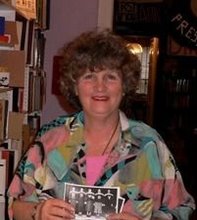"Salah's answer summed up to me what we were all doing. We were all struggling to achieve for our children a future without roadblocks, tanks, tear gas, or administrative detention. A future not shadowed by a pervasive sense of our being wronged." Words of Sari Nusseibeh, from his book, Once upon a Country: A Palestinian Life (2007) speaking about his liberation work in 1990
In my head through my days here in West Brunswick, days marked by health worries and now, the death of a dear friend, Joyce Warshow, film maker and lesbian activist, I keep writing letters to Wendy. How cold I must seem to her and perhaps to others when I say, we cannot let our historical and cultural empathies be walled in by the Holocaust horror. In every word I write lives the realization that once almost the whole of the Western world found Jews an expendable people, fit for extermination, and in a clear headed and at times, joyous way, in between eating a cup of fresh summer blue berries with cream, fired up the gas chambers or turned away the ships from their safe harbors. In a recent Nestel family history--my father's family, my father whom I never knew, his sudden death in 1939 six months before I was born taking his voice and body from me forever, I found the names of the women, men and children who died in the Belzec camp--among them Zippora and her husband Henoch and their two children, Aron and Eidel. I also found survivors who now live in Israel. We carry this knowledge of the deadening of the human heart in almost biological places as well as in our food and in our jokes, in our tears and in our life's dreams. But it is because I know how easily the heart can die when it is convinced that another group of people threaten already fragile geographies or how easily it can be convinced that some are so different from us that they must become shadows. And if these people have been reduced by circumstances and our power rises above them like a looming mountain, then we do not even see their diminishment. We just do what we have to and enjoy our morning coffee in a pleasant Haifa cafe.
Haaretz editorial, 03/10/2007
The occupied territories and the Palestinians living there are slowly becoming virtual realities, distant from the eye and the heart. Palestinian workers have disappeared from our streets. Israelis no longer enter Palestinian towns for shopping. There is a new generation on each side that does not know the other. Even the settlers no longer meet the Palestinians because of the different road systems that distinguish between the two populations; one is free and mobile, the other stuck at the roadblocks.
While the politicians argue over dividing the land between two peoples, the public is apathetic. The people feel that the division has already taken place. The disengagement from the Gaza Strip, the evacuation of Gush Katif, the construction of a separation barrier--the problem is solved to our satisfaction. The settlers are conducting a settlement policy of their own., taking over new areas, expanding settlements, anything to prevent a permanent solution. They are also satisfied with the status quo that relies on the Shin Bet secutiry service and the Israel Defense Forces.
The de facto separation is today more similar to political apartheid than an occupation regime because of its constancy. One side--determined by national, not geographic association--included people who have the right to choose and the freedom to move, and a growing economy. On the other side are people closed behind walls surrounding their community, who have no right to vote, lack freedom of movement and have no chance to plan their future. The economic gap is only getting wider and the Palestinians are wistfully watching as Israel imports laborers from China and Romania. Fear of terroist attacks has transformed the Palestinian laborer into an undesirable.
There have recenly been reports of a further "upgrading" of the occupation. Sixteen crossing points between the West Bank and Israel are now being controlled by civilians instead of soldiers. On the face of it, this is an act of normalization, similar to the situation at international border crossings. But in this case a country exists on one side. In the absence of an agreed border, there is only a security border that Israel has unilateraaly established. The frustrated and frightened soldiers checking every Palestinian have now been replaced by contractors hired by the Defense Ministry.
Their job is check people holding permits; in other words, people the civil adminstration, under the Shin Bet's quidance, has allowed to enter Israel. The checks are being carried out, in reinforced, blast-proof structures. The new method has removed a burden from IDF soldiers but has created a distancing. The contact between the soldiers and the Palestinians at the crossings, precisely because it is so traumatic, has driven the Israelis and Palestinians to seek a political solution. The stories the soldiers brought home fueled public debate. Now the soldiers are stationed only at roadblocks in the West Bank, and there is less friction. So the discourse is minimized.
Can this situation continue indefinitely? The more Israelis see less of the occupation, the easier it becomes to ignore. In September, 33 Palestinians and one soldier were killed in operations against terror and Qassam rockets. Only in the next intfada, or after missiles are fired at Israel from the West Bank, will we once again be reminded of the occupation.
From Sari Nusseibeh's book: "'Baba,' said my youngest boy, Buraq, from the back seat of the car as I drove him to school one morning. (He couldn't have been more then seven at the time.'I'd like to know something. Was there ever life before the intifada?' The question cut through my heart like a knife."
Friday, October 5, 2007
Subscribe to:
Post Comments (Atom)

No comments:
Post a Comment